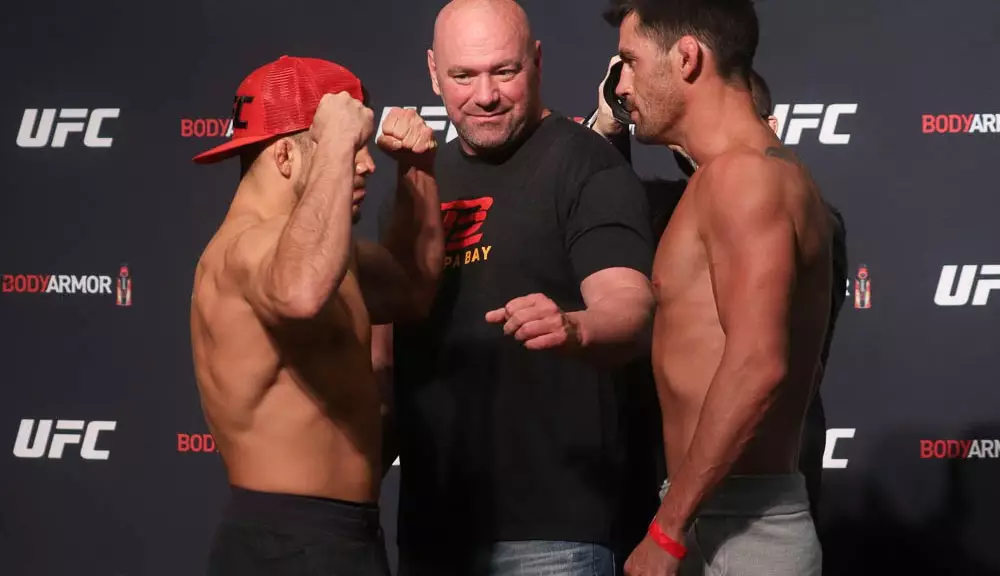As Dominick Cruz prepares for his highly anticipated return to the UFC after a lengthy absence of over two years, he’s found himself embroiled in a situation that speaks volumes about the complexities of matchmaking in professional mixed martial arts. Cruz, with an impressive record of 24 wins and 4 losses, is scheduled to face Rob Font at UFC Fight Night 252, a co-main event that has caught the attention of many fans. However, overshadowing this matchup is Cruz’s lingering desire for a rematch against Henry Cejudo, the former bantamweight champion who ended Cruz’s title reign with a decisive TKO victory back in May 2020.
Cruz’s predicament highlights the intriguing dynamics of fight promotions, where fighters often find themselves at the mercy of the matchmaking process. Cruiser’s specific case is more than just a statistic; it’s a reminder of the emotional investment that fighters have in their careers and the narratives that they want to build. Being placed on the same card as Cejudo—who is set to headline the event against Song Yadong—seems emblematic of the challenges that Cruz faces as he aims to reclaim his status in the octagon.
At its heart, Cruz’s frustration comes from a desire to settle the score with Cejudo. He has openly articulated that a rematch with the man who handed him a loss in their previous encounter is of significant personal and professional importance. “I would have rather had a rematch, to be honest,” Cruz stated, revealing the deep-seated desire for athletes to compete against those who add layers to their legacies. Fighters, particularly those with a history like Cruz and Cejudo, are keenly aware that their legacies are forged through rivalries, narratives, and the resolution of unfinished business in the cage.
Cruz’s comments also raise an important point regarding communication—or the lack thereof—among matchmakers, fighters, and their management teams. Cruz has encountered mixed signals in the matchmaking process, highlighting the often convoluted nature of negotiations in the UFC. Sean Shelby, one of the prominent figures in the matchmaking realm, has conveyed that Cejudo wasn’t interested in the rematch, only for Cruz to hear contradicting sentiments from Cejudo’s manager. This disconnect reflects a broader issue in MMA where fighters feel like pawns in a larger game, with their ambitions occasionally sidelined by business decisions and promotional strategies.
Cruz’s reflection on the UFC’s modus operandi reveals a deeper understanding of the sport’s ecosystem. He noted, “UFC isn’t going to try to give me some kind of ‘because they like me’ fight or something,” encapsulating the notion that beyond talent, marketability plays a crucial role in how fights are arranged. The realities of the sport are that not every fighter has the luxury of ensuring they receive matchups that resonate with their own narratives; instead, they must navigate a landscape where popularity and drawing power can supersede merit.
Cruz also wisely reminds fans and fighters alike of the unpredictable nature of the fight game. “You just kind of get thrown to the wolves in the UFC,” he quipped, underscoring the ruthless competition inherent in mixed martial arts. This brutal honesty connects with fans who sometimes forget the professional challenges that fighters face behind the scenes. The headlines might focus on the excitement of matchups, but the intricate dance of negotiations and business decisions often dictates the fighters’ journeys far more than anyone outside the organization could ever realize.
As Dominick Cruz readies himself for his bout against Rob Font, the backdrop of his concerns regarding matchmaking looms large. His desire for a rematch with Cejudo reflects not only a personal vendetta but a quest for relevance in an unforgiving sport where narratives are paramount. While the UFC continues to draw in audiences with its spectacle, it’s crucial to recognize the human stories underlying each bout—stories of ambition, legacy, and a relentless drive to compete.
Ultimately, the challenges faced by Cruz are not unique but rather indicative of the broader issues within the sport. This narrative serves as a potent reminder of the fine line fighters must walk between their ambitions and the business decisions that shape their careers. For Cruz, the immediate focus may be on Font, but as with many fighters, it’s the lingering aspirations and unfinished narratives that define their legacies, both inside and outside the octagon.

